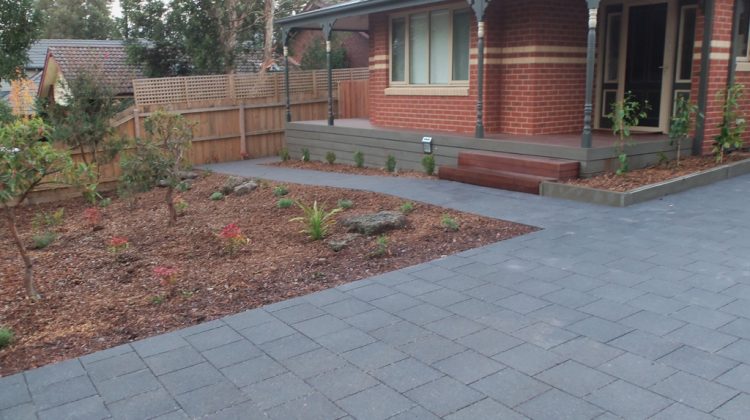
Relative to the more common types of paving material—concrete, asphalt, and gravel—water permeable pavers are quite a modern solution. The basic idea of water permeable pavers, and in particular, those made from recycled ceramic tiles, is to provide a paving solution that dominates the market at the intersection between water permeability, aesthetics, affordability, commercial viability, and environmental responsibility.
What are Ceramic Based Water Permeable Hydropavers®?
Before we work out the pros and cons of water permeable pavers, it’s important to get clear on exactly what we’re talking about. The water permeable pavers in question here are known as Premier Hydropavers®.
The remarkable fact about Premier Hydropavers®, which are made from a ceramic based material, is the level of permeability present in the paver itself, which takes a staggering water load away from the joints of the paving system. This means that heavy water flow is dispersed evenly throughout the area of paving. We’ll take a look at the massive benefits of even water dispersal shortly. But first, let’s get a grip on the material itself.
As a consequence of innovative manufacturing techniques, Premier Hydropavers® use a ceramic-based material with unique properties. Recycled ceramic tiles are crushed, before being heated to 1,200°C, just below melting point. In combination with a high pressure moulding process, strong yet porous bonds between individual grains of ceramic are developed.
This innovative material has been highly successful in Chinese markets, and is beginning to gain explosive traction in Australia and New Zealand. With the strength and durability to function in a variety of commercial settings, water permeable pavers are highly favoured in the following markets:
- Driveways and patios
- Public, commercial, and private carparks
- Gardens, pathways, and various pedestrian areas
- Public parks and exposed event locations
Each of these significant markets have in common the need for a paving material that combines first class water drainage with strength, durability, and aesthetic malleability.
Weighing up the Competition: Water Permeable Pavers Versus the Rest
We’ve already touched on many of the beneficial properties of water permeable pavers, but it’s helpful to point explicitly to the reasons our ceramic based Hydropavers® stand out from the crowd. The predominant feature of ceramic based Hydropavers® that simply cannot be ignored is the staggering water dispersal capabilities.
Broad water dispersal
The innovative development of pavers that absorb water across their entire surface has a number of notable benefits. Rather than passing the buck to run-off drainage systems and paving joints, ceramic based Hydropavers® can allow 60mm of rainfall per hour to permeate through their entire surface, bearing a 25% level of porosity.
Not only does this provide a degree of safety from the dangers of water run-off, along with a reduction to the occurrence of ‘urban heat island effect’ through the evaporation of a percentage of water held in the paving itself, the durability of the paving itself is significantly heightened.
Durability
Permeable pavers demonstrate an excellent degree of durability over time. On an aesthetic level, as with all ceramic products, Hydropavers® will hold their colour and appeal for many years.
Hydropavers® maintain a British Pendulum Number slip resistance rating of at least 65, and a breaking load of 10 to 20kN. Providing a diligent site testing appraisal is conducted to allow for the most effective subbase design and pattern category to be selected, Hydropavers® can bear a significant traffic load.
Environmental Responsibility
Paving choice has a considerable impact on the environment. Ceramic based Hydropavers provide an environmentally friendly solution to many of the challenges our cities face today.
By increasing groundwater supply and preventing soil erosion, our waterways will remain cleaner due to a reduction in waste caused by runoff drainage. Additionally, due to the natural filtration mechanism of porous ceramic, rainwater is purified. This makes a wonderful contribution to water recycling efforts.
Additionally, the high water permeability of Hydropavers contributes to a reduction in the impact of ‘urban heat island effect’. An urban heat island refers to a metropolitan location that exhibits notably higher temperatures than the surrounding rural areas.
By storing a percentage of water that falls on the paving location, the surface temperature of the paver will remain significantly lower than common paving materials like concrete and asphalt. As the absorbed water begins to evaporate, the surrounding area will maintain a lower temperature relative to alternative options.
For more information visit benefits of water permeable pavers.


